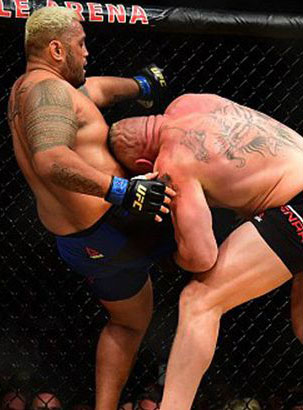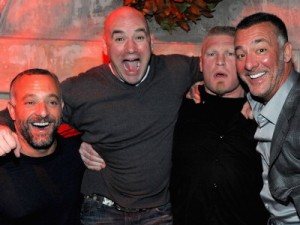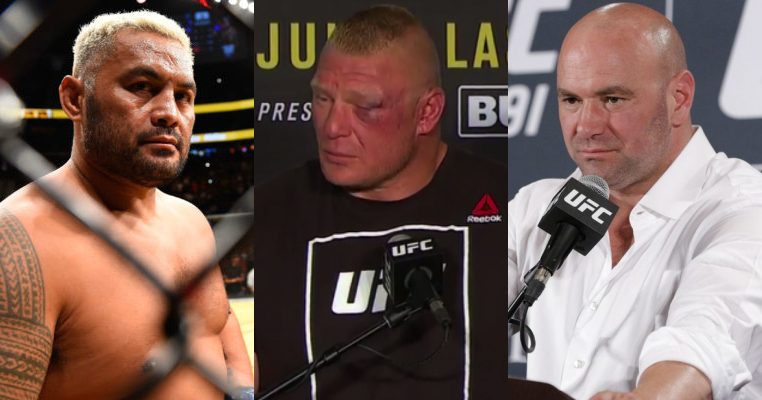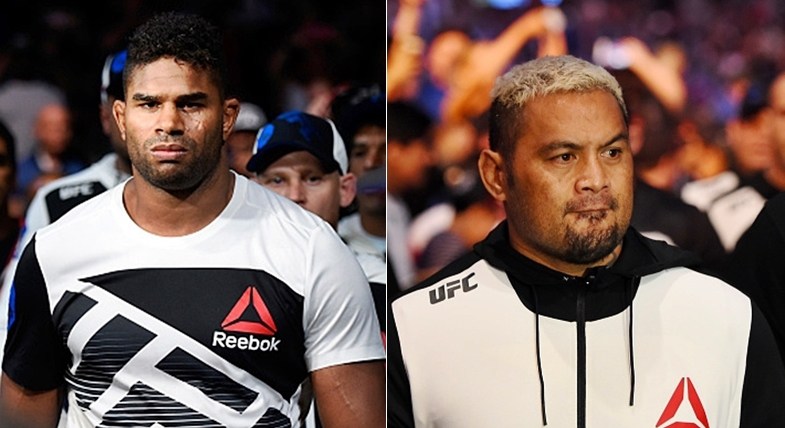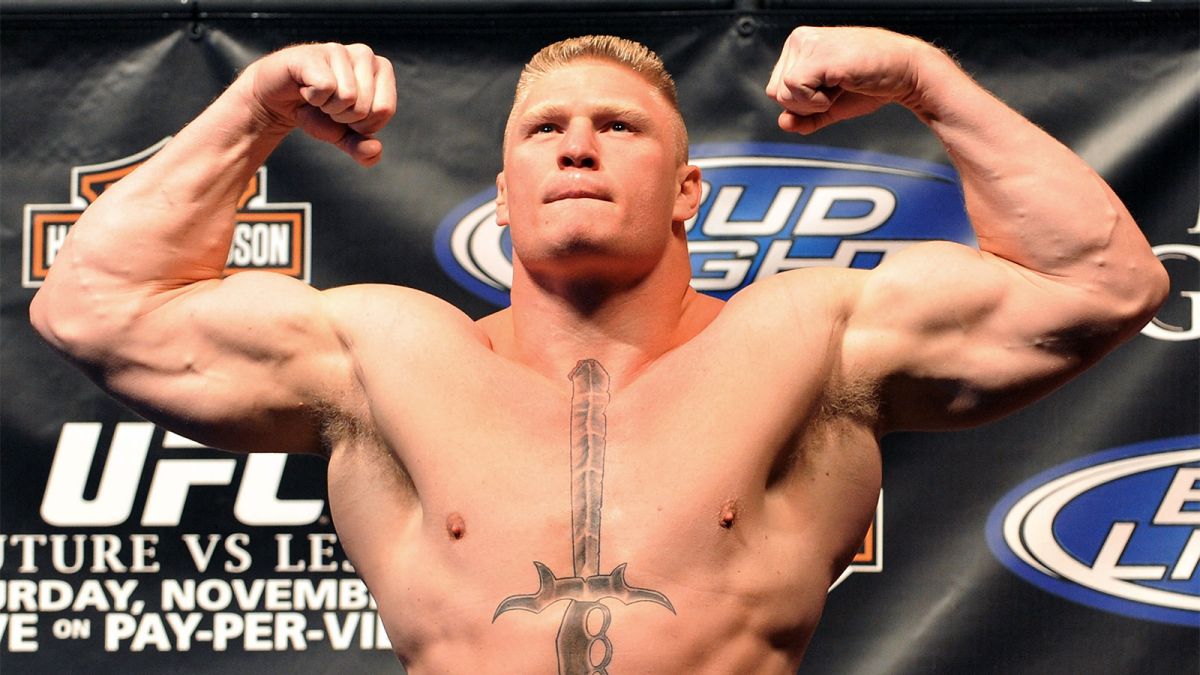Mark Hunt has established himself as a premier fighter in combat sports, having reached the peak of success in kickboxing (as a K-1 Grand Champion), then diving headfirst into mixed martial arts, competing in the two largest organizations in the sport (PRIDE and the Ultimate Fighting Championships). Hunt’s entry into MMA wasn’t spectacular, but with tenaciousness, hard work, determination, drive, an iron jaw, and spectacular punching power, he has turned himself from a potential also-ran into a top-ranked heavyweight in the biggest organization in mixed martial arts.
Hunt is known and loved for the many wars he has engaged in inside of the Octagon, and this Saturday night, on the opening bout of the UFC 209 main card, we will get a matchup of former UFC title challengers and former K-1 champions, when Hunt stands across the cage from Alistair Overeem. But that isn’t the only war Mark Hunt is walking into; outside of the cage, Hunt is waging war against his employer in a fight he can’t afford to lose. Mark Hunt is fighting two wars — one inside the cage, the other outside of it. Today we explore the fight outside of the cage.
Hunt’s first battle started early in 2016 when he was chosen by the UFC to face Brock Lesnar. From the word go, a lot of “suspicious” activity was happening, including but not limited to Lesnar being given an exemption from early drug testing so he would be able to compete at UFC 200. To show the contrast in how harshly rules are enforced depending on the fighter’s name and ability to draw, Angela Hill was unable to compete in an earlier UFC event because she hadn’t been subject to testing prior to her reintroduction to the UFC. Hunt, being a veteran of professional combat sports, already saw the writing on the wall, and in multiple interviews on a variety of platforms he repeatedly expressed thoughts and concerns about Lesnar’s possible use of performance enhancing drugs.
Ultimately the fight happened, and with the exception of a few moments of sustained offense, Hunt was taken down and thoroughly outwrestled on the way to a three-round decision. All was good for the UFC, as a big star had been reintroduced to the heavyweight division and Lesnar was reestablished as a fighter who was capable of competing with and beating the best. Hunt’s momentum was halted, but he got a main card spot, a big payday, and lost little luster losing in a manner expected and predicted by the majority of MMA fighters, coaches, and media. It was a situation where there were no real losers, only winners, then the wheels fell off and the drums of war began to be pounded.
Lesnar failed his pre-fight tests and post-fight tests; the post-fight test failure was treated in the typical manner these sorts of offenses are, with fines being levied and the opportunity to compete in the Octagon being taken away via suspension. Neither was met with much celebration from the mixed martial art world, given the amount of Brock’s purse and his status as a part-time fighter (i.e., a guy who didn’t depend on the sport as his primary source of income). But what was particularly concerning was the fact that Lesnar had failed a test before the fight; in most cases a fighter is pulled from a card until things are clarified as to whether the fighter has in fact been rightfully flagged or if an error had been made. That wasn’t the case for Lesnar, who was allowed to compete, unlike multiple other fighters pulled from cards because of failed pre-fight (out of competition) tests. This was the last straw for Mark Hunt, who decided he was going to take a stand against the organization and against the PED culture he felt was rampant in the UFC.
First Hunt spoke out, chiding the UFC and the governing bodies of testing for their part in this debacle. Then he asked for his release, which was a nonstarter. If you’re new to combat sports, you might not know that viable heavyweights are more rare than unicorns, and no organization is releasing them to be scooped up by other organizations until they have exhausted all uses for said heavyweight. This left Hunt with only one avenue to evoke change, and to get the retribution he felt was due to him: he had to fight.
Under the best of circumstances Hunt would prefer to focus on one fight, especially when facing such a skilled, experienced, and well-funded opponent. But Hunt, like the rest of us, lives in the real world, meaning he has bills to pay and family to support. As an aging fighter on the decline, challenging his employer to a fight is a dangerous play, even if it is a necessary one in his eyes. In one sense, it’s a smart play because he doesn’t have a whole career in front of him to consider. This means he has the freedom to commit wholeheartedly to this fight because there really is no long-term future for him inside the Octagon. On the other side of the coin, that means he has to make the most of the opportunities he has as his career comes to an end. Depending on how the organization chooses to handle things, those opportunities could be few and far between, or they could be opportunities that can really have a high price tag after his career is done. Make no mistake, this fight may not be physically damaging, but it is no less dangerous than any fight he has engaged in over the length of his career.
With a fight like this looming, Mark Hunt would like to focus and prepare; unfortunately for him, he has a family to support and expenses to be paid. What this means is that Hunt has two opponents: one that will try to finish him outside the cage, the other trying to accomplish the same goal inside of it. In the next installment we will address that matchup and the potential ramifications win or lose when Hunt faces Alistair Overeem Saturday night at UFC 209.
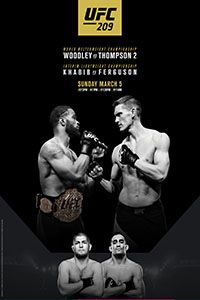
UFC 209: Woodley vs. Thompson 2 takes place March 4, 2017 at T-Mobile Arena in Las Vegas, Nevada.
Click the stars to rate how good you think UFC 209 will be.
**********

